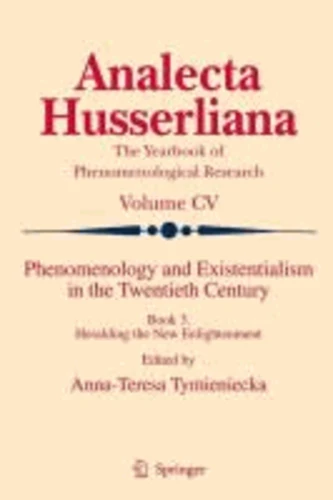Phenomenology and Existentialism in the Twenthieth Century 3. Heralding the New Enlightenment
Par :Formats :
- Paiement en ligne :
- Livraison à domicile ou en point Mondial Relay indisponible
- Retrait Click and Collect en magasin gratuit
- PrésentationCartonné
- Poids0.74 kg
- Dimensions19,3 cm × 24,3 cm × 2,8 cm
- ISBN978-90-481-3784-8
- EAN9789048137848
- Date de parution01/07/2010
- CollectionAnalecta Husserliana
- ÉditeurSpringer
Résumé
The great flourishing in the Twentieth Century of the amalgamated movement of Phenomenology and Existentialism, having reached its unfolding and reverberation - as we have shown in our two preceding books and continue in this one - seems to have spanned the entire gamut of their marvels.Although the philosophical field is being still corroborated by phenomenologico-existential insights, phenomenology remains itself enigmatic.
The question of its foundations, as the source of sense remaining unsolved by Husserl (herein Verducci's study of Husserl and Fink, infra-page).And yet, the deepest phenomenologico-existential inspiration undertakes a new critique of reason (Verducci), the pivotal role of Imaginatio Creatrix (Egbe), Jean Wahl's quest after ultimate meaning (Kremer-Marietti) and the Logos of the "Moral Sense" (Cozma and Szmyd).
Phenomenology is then reborn in the ontopoiesis of life (Tymieniecka) as "first philosophy" (Haney). We have here a powerful ferment we may call the New Enlightenment.
The question of its foundations, as the source of sense remaining unsolved by Husserl (herein Verducci's study of Husserl and Fink, infra-page).And yet, the deepest phenomenologico-existential inspiration undertakes a new critique of reason (Verducci), the pivotal role of Imaginatio Creatrix (Egbe), Jean Wahl's quest after ultimate meaning (Kremer-Marietti) and the Logos of the "Moral Sense" (Cozma and Szmyd).
Phenomenology is then reborn in the ontopoiesis of life (Tymieniecka) as "first philosophy" (Haney). We have here a powerful ferment we may call the New Enlightenment.
The great flourishing in the Twentieth Century of the amalgamated movement of Phenomenology and Existentialism, having reached its unfolding and reverberation - as we have shown in our two preceding books and continue in this one - seems to have spanned the entire gamut of their marvels.Although the philosophical field is being still corroborated by phenomenologico-existential insights, phenomenology remains itself enigmatic.
The question of its foundations, as the source of sense remaining unsolved by Husserl (herein Verducci's study of Husserl and Fink, infra-page).And yet, the deepest phenomenologico-existential inspiration undertakes a new critique of reason (Verducci), the pivotal role of Imaginatio Creatrix (Egbe), Jean Wahl's quest after ultimate meaning (Kremer-Marietti) and the Logos of the "Moral Sense" (Cozma and Szmyd).
Phenomenology is then reborn in the ontopoiesis of life (Tymieniecka) as "first philosophy" (Haney). We have here a powerful ferment we may call the New Enlightenment.
The question of its foundations, as the source of sense remaining unsolved by Husserl (herein Verducci's study of Husserl and Fink, infra-page).And yet, the deepest phenomenologico-existential inspiration undertakes a new critique of reason (Verducci), the pivotal role of Imaginatio Creatrix (Egbe), Jean Wahl's quest after ultimate meaning (Kremer-Marietti) and the Logos of the "Moral Sense" (Cozma and Szmyd).
Phenomenology is then reborn in the ontopoiesis of life (Tymieniecka) as "first philosophy" (Haney). We have here a powerful ferment we may call the New Enlightenment.

